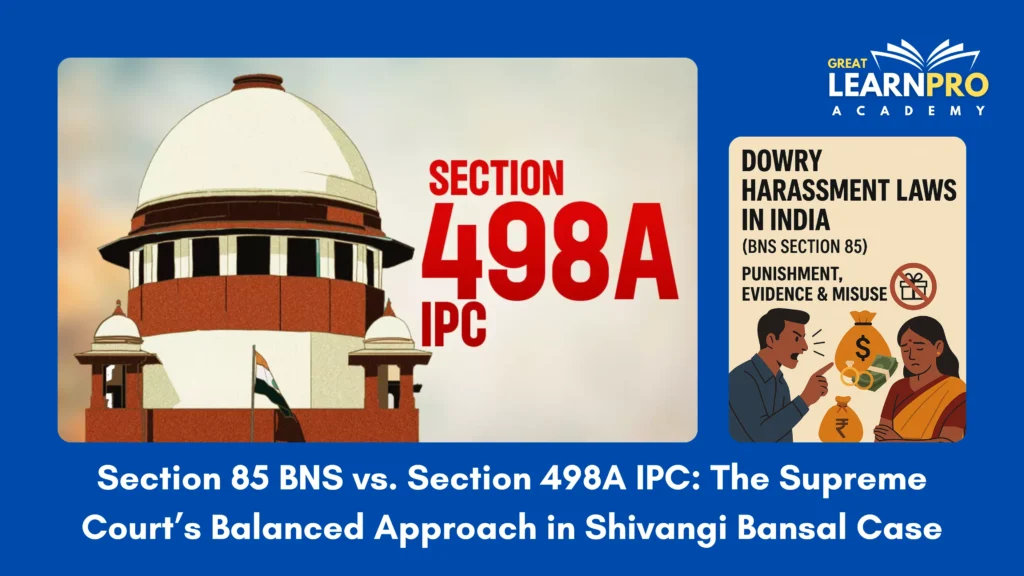Introduction: From Section 498A IPC to Section 85 BNS
When India replaced the Indian Penal Code (IPC) with the Bharatiya Nyaya Sanhita (BNS) in 2023, one of the most discussed provisions was the renumbering of Section 498A IPC the law that criminalised cruelty by a husband or his relatives towards a woman. This provision, once a cornerstone of women’s protection against dowry-related harassment and domestic cruelty, now finds its place as Section 85 of the BNS.
Though the substance of the law remains largely the same, the procedural and interpretative contours have shifted following recent judicial and editorial developments. The landmark Supreme Court case Shivangi Bansal v. Sahib Bansal (2025) has reignited national debate on the balance between safeguarding women’s rights and preventing misuse of the law.

Evolution of the Law: The Purpose and the Problem
Section 498A IPC was enacted in 1983 to address a rising tide of dowry deaths and cruelty faced by married women. It penalised both mental and physical cruelty inflicted by a husband or his relatives. However, over time, the section became controversial due to allegations of misuse cases where the complaint was allegedly filed with mala fide intent, leading to automatic arrests of entire families.
Section 85 of the BNS continues the same principle: cruelty towards a woman by her husband or his relatives is a cognizable and non-bailable offence. Yet, in the new legal environment, courts have been increasingly emphasizing procedural fairness, mediation, and preventive safeguards against false implications.
The Case of Shivangi Bansal v. Sahib Bansal (2025)
In this 2025 case, the Supreme Court addressed a series of matrimonial disputes between the parties multiple criminal complaints, civil proceedings, and allegations of harassment and cruelty. The Court not only mediated a settlement between the couple but also laid down important procedural safeguards in cases filed under Section 498A IPC, now recognized as Section 85 BNS.
The Supreme Court reaffirmed the guidelines originally issued by the Allahabad High Court in 2022 regarding the handling of cruelty cases. The key highlights include:
- No immediate arrest: A “cooling-off period” of two months should be observed before any arrest in such cases, allowing space for reconciliation or mediation.
- Family Welfare Committees (FWC): Complaints must first be referred to these committees for a preliminary inquiry and mediation before coercive action is taken.
- Encouragement of settlement: Courts and police authorities are urged to prioritize dialogue and mutual settlement, where possible, over prolonged criminal trials.
The Supreme Court, invoking its special powers under Article 142 of the Constitution, also quashed multiple cross-cases between the parties, underlining the importance of finality and closure in marital disputes.
Editorial Reactions and Scholarly Debate
The judgment has sparked wide debate in legal and editorial circles. Some commentators hailed it as a progressive step towards fairness, while others feared it may unintentionally weaken the protection mechanisms for genuine victims.
- A Step Toward Balanced Justice:
Legal analysts have praised the judgment for reinstating procedural safeguards. They argue that the two-month cooling period and the FWC mechanism prevent arbitrary arrests, reduce harassment of innocent family members, and encourage amicable settlement — a need long felt in matrimonial litigation. - Concerns Over Delayed Relief:
Critics, however, warn that excessive procedural caution might delay protection for victims genuinely facing cruelty. Immediate police intervention can be vital in cases of violence, and delaying arrest could expose victims to further risk. - Restoring Faith in the System:
Some editorials describe the decision as a long-overdue reform that restores faith in the criminal justice system. By institutionalising mediation and community-based resolution mechanisms, the Court aims to humanise the process while preserving deterrence against actual abusers. - Conviction Rates and Misuse Concerns:
Statistical data over the past decade show that conviction rates under Section 498A have been alarmingly low, hovering below one percent in many states. This has strengthened the argument for procedural safeguards to distinguish genuine cases from exaggerated or false complaints.
Implications for the Future
The Shivangi Bansal judgment has implications far beyond one family’s dispute. It sets a precedent for how Section 85 BNS cases will now be handled across India. Police will be required to document reasons for arrest, refer cases to Family Welfare Committees, and ensure compliance with the two-month mediation window.
For victims, this means a more structured process but also the challenge of navigating additional procedural steps before justice is delivered. For accused family members, it brings relief from the fear of immediate arrest and humiliation. For the courts, it promises reduced frivolous litigation and greater emphasis on pre-trial resolution.
Conclusion: The Search for Balance
The Supreme Court’s intervention in Shivangi Bansal v. Sahib Bansal marks a defining moment in the evolution of India’s matrimonial cruelty laws. By reaffirming the safeguards first proposed under Section 498A and adapting them to Section 85 of the BNS, the Court has sought to create a balanced, humane, and fair process.
Yet, the real test will lie in implementation whether Family Welfare Committees function effectively, whether police officers act sensitively, and whether genuine victims are still able to access timely protection. The law’s strength lies not just in its wording, but in how compassion and caution coexist within its application.
In essence, Section 85 of the BNS represents the next chapter in India’s ongoing effort to harmonize protection, justice, and fairness within the most personal of all relationships marriage.
Sources:
- https://www.livelaw.in/sc-judgments/2025-livelaw-sc-735-shivangi-bansal-vs-sahib-bansal-298459?utm_
- https://www.barandbench.com/news/no-arrest-in-section-498a-cases-for-first-2-months-supreme-court-revives-allahabad-hc-directives-in-matrimonial-cases?utm_
More Current affairs: https://learnproacademy.in/updates/
